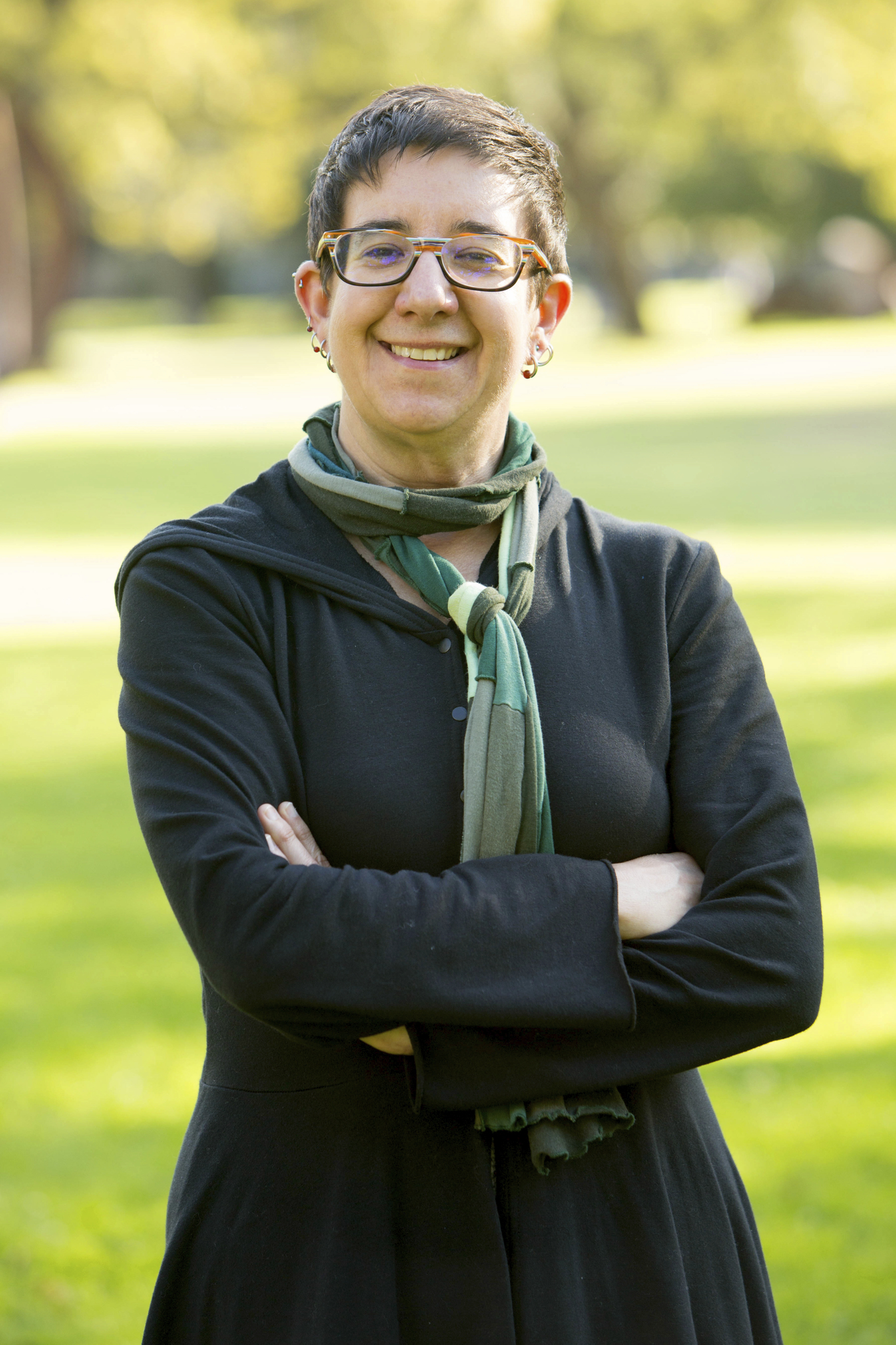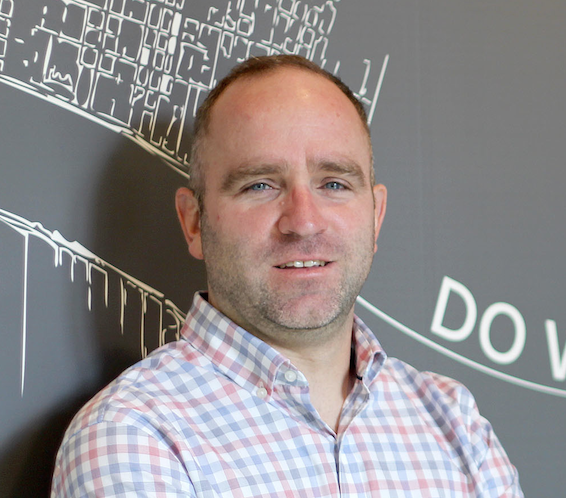Community Capacity & Resilience Building
Featured Effort: CRGC In-Person Preparedness and Resilience Survey
To meet our objectives to help communities across the Gulf Coast to more effectively understand, withstand, and overcome the multiple stressors brought on by disasters like the DWH oil spill, a recent CRGC project was the in-person survey.
The CRGC in-person survey was a cross-sectional in-person survey carried out by our research team from Tulane University in 2017, led by Dr. Amy Lesen and Dr. Reggie Ferreira. The survey was implemented in the three communities where the Consortium had placed community health workers: the Port Sulphur area in lower Plaquemines Parish, Louisiana; the Galliano area in lower Lafourche Parish, Louisiana; and the Bayou La Batre area in lower Mobile County, Alabama.
These three communities had initially been chosen for the Community Health Worker Program based on four selection criteria: (a) communities defined by geography; (b) the presence of active and effective community- or faith-based organizations operating in the community; (c) pre-existing relationships between project researchers and community organizations, activists and leaders; and (d) characteristics including resource dependent economies, presence of vulnerable populations, and significant negative impacts from Deepwater Horizon oil spill.
The 60-minute in-person survey investigated the role of social networks, risk perception, preparedness measures, individual resilience, and demographics as predictors of preparedness and resilience for future hydrocarbon (oil spill) and other disaster events among households in the Gulf of Mexico.
Between June and November 2017, 21 trained data collectors administered the IRB-approved survey (Tulane Institutional Research Board Study #997431) to 326 individuals across all three sites. The data collectors were all Tulane University graduate students and faculty, except for three data collectors in Alabama who were staff of our community partner organization there and administered the survey in Vietnamese.
The survey instrument was a product of cross-disciplinary collaboration between CRGC researchers and featured questions about participants’ social networks, images participants associate with oil spills, past disaster exposure including disasters caused by both natural and technological hazards, oil spill disaster planning and risk perception based on the Protective Action Decision Model (Lindell and Perry 2004, 2012), perceived oil spill consequences, attitudes about job retraining and relocation for work, resilience attributes based on the 10-item Connor-Davidson Resilience Scale (Connor and Davidson 2003; Campbell-Sills and Stein 2007) and participant demographics.
Related News
Building Community Resilience to Large Oil Spills
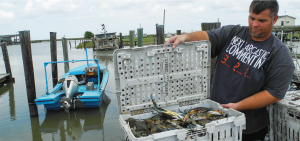 What could communities, government officials, nongovernment organizations, businesses, and scientists do to build community resilience to large oil spills? Answering that question was the goal of CRGC researchers as they researched and wrote their final report, Building Community Resilience to Large Oil Spills: Findings and Recommendations from a Synthesis of Research on the Mental Health, Economic, and Community Distress Associated with the Deepwater Horizon Oil Spill.
What could communities, government officials, nongovernment organizations, businesses, and scientists do to build community resilience to large oil spills? Answering that question was the goal of CRGC researchers as they researched and wrote their final report, Building Community Resilience to Large Oil Spills: Findings and Recommendations from a Synthesis of Research on the Mental Health, Economic, and Community Distress Associated with the Deepwater Horizon Oil Spill.
Blue Crabs, Survey Panels, and More
 CRGC researchers have been busy publishing new research. Two of note: Jacqueline Fiore, Craig Bond, and Shanthi Nataraj released a working paper on “The Impact of the Deepwater Horizon Spill on Commercial Blue Crab Landings”; and Andrew Parker, Amanda Edelman, Katherine Carman, and Melissa Finucane have a journal article “On the Need for Prospective Disaster Survey Panels.” Many more papers are available, linked from our website. View all research results »
CRGC researchers have been busy publishing new research. Two of note: Jacqueline Fiore, Craig Bond, and Shanthi Nataraj released a working paper on “The Impact of the Deepwater Horizon Spill on Commercial Blue Crab Landings”; and Andrew Parker, Amanda Edelman, Katherine Carman, and Melissa Finucane have a journal article “On the Need for Prospective Disaster Survey Panels.” Many more papers are available, linked from our website. View all research results »
Paper Explores Challenges Reaching Vulnerable Populations in Gulf Coast
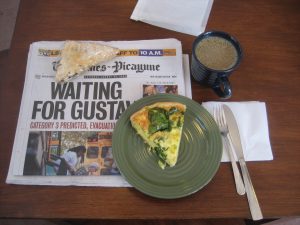 Delivering risk and crisis communication to U.S. Gulf Coast residents poses a unique challenge to individual and organizational responders, according to a new paper by Elizabeth Petrun Sayers and several CRGC coauthors. Their findings highlight significant differences in preferred communication channels and levels of trust in information sources. Read more »
Delivering risk and crisis communication to U.S. Gulf Coast residents poses a unique challenge to individual and organizational responders, according to a new paper by Elizabeth Petrun Sayers and several CRGC coauthors. Their findings highlight significant differences in preferred communication channels and levels of trust in information sources. Read more »
Study Improves Disaster Resilience Training for Community Health Workers
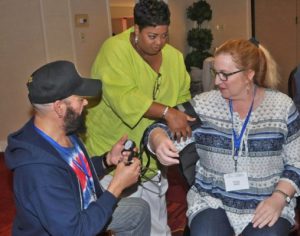 To improve disaster resilience in targeted communities that were especially hard-hit by the 2010 Deepwater Horizon oil spill, CRGC worked with its partners from the University of South Alabama’s Coastal Resource and Resiliency Center (CRRC) to train and deploy seven lay Community Health Workers (CHWs) in community-based organizations and community health clinics in Bayou La Batre, AL, Galliano, LA, and Port Sulphur, LA. CRGC researchers, Keith Nicholls, PhD, Steven J. Picou, PhD, and Selena C. McCord recently published findings on how to better prepare CHWs, who take active roles in disaster preparedness, response, and recovery, in the Journal of Public Health Management and Practice: Training Community Health Workers to Enhance Disaster Resilience. Read more »
To improve disaster resilience in targeted communities that were especially hard-hit by the 2010 Deepwater Horizon oil spill, CRGC worked with its partners from the University of South Alabama’s Coastal Resource and Resiliency Center (CRRC) to train and deploy seven lay Community Health Workers (CHWs) in community-based organizations and community health clinics in Bayou La Batre, AL, Galliano, LA, and Port Sulphur, LA. CRGC researchers, Keith Nicholls, PhD, Steven J. Picou, PhD, and Selena C. McCord recently published findings on how to better prepare CHWs, who take active roles in disaster preparedness, response, and recovery, in the Journal of Public Health Management and Practice: Training Community Health Workers to Enhance Disaster Resilience. Read more »
Tulane’s Disaster Resilience Leadership Academy Hosts: Leadership in Peacetime and Crisis
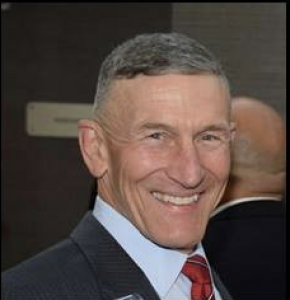 Major General Michael Regner (Image provided by DRLA)[/caption] On Saturday, December 2nd, Tulane’s Disaster Resilience Leadership Academy (DRLA) will welcome Major General Michael Regner, who will present Leadership in Peacetime and Crisis. Major General Regner will discuss topics including: (1) Resiliency in Peacetime and Crisis; (2) Crisis Communication; (3) Casualties – Civilians and Military Members; (4) Humanitarian Assistance and Cultural Awareness; and (5) Designing Your Leadership Philosophy. Learn more»
Major General Michael Regner (Image provided by DRLA)[/caption] On Saturday, December 2nd, Tulane’s Disaster Resilience Leadership Academy (DRLA) will welcome Major General Michael Regner, who will present Leadership in Peacetime and Crisis. Major General Regner will discuss topics including: (1) Resiliency in Peacetime and Crisis; (2) Crisis Communication; (3) Casualties – Civilians and Military Members; (4) Humanitarian Assistance and Cultural Awareness; and (5) Designing Your Leadership Philosophy. Learn more»
How to Rebuild After This Year’s Hurricane Season? Invest in Resilience!
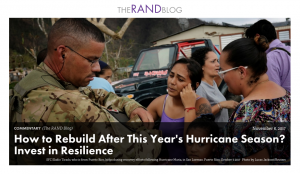 Check out the latest commentary on The RAND Blog! Director of CRGC, Melissa L. Finucane (@MelissaFinucane), who is a Senior Social and Behavioral Scientist at RAND, discusses the extremely active 2017 Atlantic hurricane season- as well as the range of risks posed by future disasters- and implications on community and infrastructure resilience in the Gulf of Mexico. Learn more»
Check out the latest commentary on The RAND Blog! Director of CRGC, Melissa L. Finucane (@MelissaFinucane), who is a Senior Social and Behavioral Scientist at RAND, discusses the extremely active 2017 Atlantic hurricane season- as well as the range of risks posed by future disasters- and implications on community and infrastructure resilience in the Gulf of Mexico. Learn more»
CRGC Director, Dr. Melissa Finucane, Shares Updates on Consortium’s Work & Research Findings
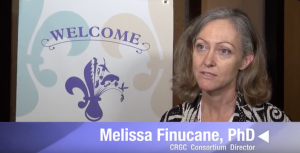 At this year’s Gulf of Mexico Oil Spill & Ecosystem Science Conference, The Gulf of Mexico Research Initiative (GoMRI) interviewed Dr. Melissa Finucane– Senior Social and Behavioral Scientist at the RAND Corporation and Director of The Consortium for Resilient Gulf Communities- about CRGC’s latest research findings and progress assessing and addressing the impacts of the 2010 Deepwater Horizon oil spill on the health, social, and economic wellbeing of people in the Gulf Coast region. Finucane speaks to CRGC’s research, outreach, and education initiatives, which are aimed at helping communities across the Gulf Coast to more effectively understand, withstand, and overcome the multiple stressors brought on by such disasters. Learn more>>
At this year’s Gulf of Mexico Oil Spill & Ecosystem Science Conference, The Gulf of Mexico Research Initiative (GoMRI) interviewed Dr. Melissa Finucane– Senior Social and Behavioral Scientist at the RAND Corporation and Director of The Consortium for Resilient Gulf Communities- about CRGC’s latest research findings and progress assessing and addressing the impacts of the 2010 Deepwater Horizon oil spill on the health, social, and economic wellbeing of people in the Gulf Coast region. Finucane speaks to CRGC’s research, outreach, and education initiatives, which are aimed at helping communities across the Gulf Coast to more effectively understand, withstand, and overcome the multiple stressors brought on by such disasters. Learn more>>
Reliable Data: The Most Empowering Tool for Hurricane Recovery
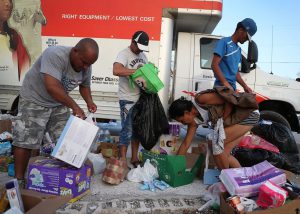 Accessibility to transparent, up to date data has proven to play a critical role in both individual- and community-level capacity to prepare for, respond to, and recover from disaster events, such as a hurricanes— Something that was especially evident following Hurricane Katrina. Denice W. Ross, a Public Interest Technology Fellow at New America and a co-founder of the Obama administration’s Police Data Initiative, spent more than a decade in New Orleans building community capacity to use government data and is continuing to broaden her work in the “open data” space by aggregating high-value data sets that can aid communities impacted by disaster. Learn more>>
Accessibility to transparent, up to date data has proven to play a critical role in both individual- and community-level capacity to prepare for, respond to, and recover from disaster events, such as a hurricanes— Something that was especially evident following Hurricane Katrina. Denice W. Ross, a Public Interest Technology Fellow at New America and a co-founder of the Obama administration’s Police Data Initiative, spent more than a decade in New Orleans building community capacity to use government data and is continuing to broaden her work in the “open data” space by aggregating high-value data sets that can aid communities impacted by disaster. Learn more>>
Customize Your Search For Resilient Gulf Resources: CRGC Launches New Resources Webpage
 CRGC is pleased to announce the launch of its new and improved Resources page, now live on the Consortium’s website. CRGC offers an exciting range of resources tailored for academics, community leaders, fishing/seafood industry stakeholders, healthcare providers, and policymakers that span across an array topic areas.
CRGC is pleased to announce the launch of its new and improved Resources page, now live on the Consortium’s website. CRGC offers an exciting range of resources tailored for academics, community leaders, fishing/seafood industry stakeholders, healthcare providers, and policymakers that span across an array topic areas.
GoMRI eNews: March 21, 2017 Edition
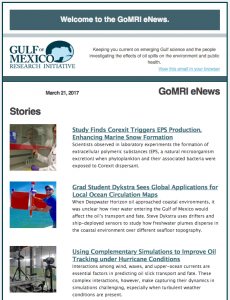 Check out the latest edition of GoMRI’s eNews, which keeps researchers, students, community members, and other stakeholders working in the field current on emerging Gulf science and the people investigating the effects of oil spills on the environment and public health. This edition of eNews features, CRGC’s Student Spotlight of Nicholas Thomas, in the Project Activities section! Learn more »
Check out the latest edition of GoMRI’s eNews, which keeps researchers, students, community members, and other stakeholders working in the field current on emerging Gulf science and the people investigating the effects of oil spills on the environment and public health. This edition of eNews features, CRGC’s Student Spotlight of Nicholas Thomas, in the Project Activities section! Learn more »

